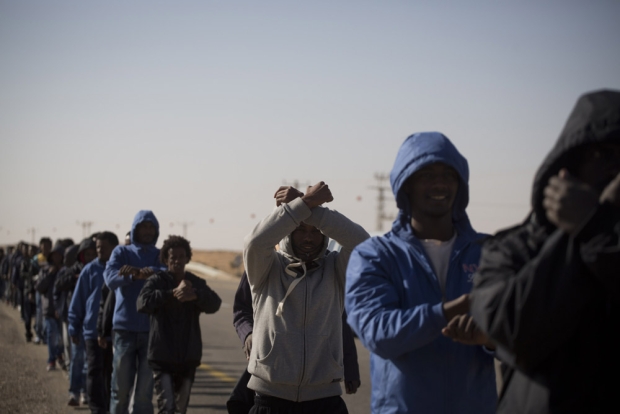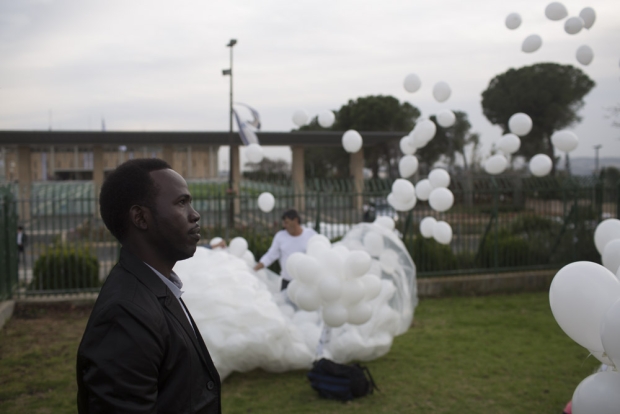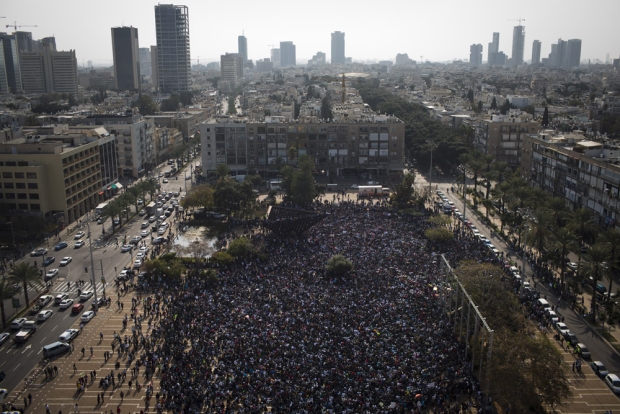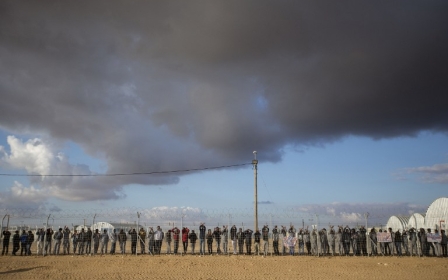Rights groups condemn Israel's latest push to jail asylum seekers

JERUSALEM - The Israeli parliament has passed a new amendment to its controversial “anti-infiltration” law amid condemnation from African asylum seekers and human rights groups who say the measure is an affront to basic human rights.
Quickly passed through the Knesset on Monday before government shut down ahead of early elections, the law passed by a vote of 47 in favour and 23 against.
"The parliament members don't really understand what is going on in our countries. We need to bring more evidence that we cannot go back right now. I hope this law will change soon," said Teshome Nega, an asylum seeker from Eritrea who has been held over the past months in Israel's Holot detention centre, a so-called 'open' facility in the country's southern Negev desert.
In the new version of the law, African asylum seekers entering Israel without a permit will be held for three months in a closed detention centre, and then transferred to a so-called 'open' detention facility for an additional 20 months.
These detention terms are shorter than under previous versions of the bill, however stiffer penalties will be applied to employers that hire asylum seekers that entered Israel illegally, and migrants will be forced to pay a monthly deposit, which will be returned after leaving the country.
The amendment also lowers the number of daily check-ins required at Holot, from three times a day to once daily.
“Now I’m going back to be jailed, I don't know for how many months, and it is not an open facility. They said the refugees can come here, but if you ask to come they don't let you, and this is the reason we came by ourselves," Nega said.
'In the name of the people jailed'
Israel is home to approximately 50,000 African asylum seekers, most of whom come from Sudan and Eritrea.
Outside parliament on Monday, a small group of Israeli activists and African asylum seekers released approximately 2,000 balloons into the air, symbolising the 2,000 asylum seekers currently jailed at the Holot detention centre.
Sigal Avivi, an Israeli activist from Tel Aviv, told MEE that the group was there to protest the law "in the name of the people jailed in Holot that could not come".
Jack Muawia, one of only a few African asylum seekers that attended the protest, added: "We have been here for seven years, and we didn't get any solution form the Israeli government. Until now, they are not acting according to international law, and even not according to local laws."
"You can't give people who run away from areas of genocide three and four years in prison," he said.
Legal challenge forthcoming
Israel's Supreme Court has overturned two previous amendments to the law, ruling that they were unconstitutional.
In December 2013, parliament legislated a second version of the law, allowing the jailing of asylum seekers who had already entered Israel for an indefinite period of time.
On 16 September 2014, however, the Supreme Court determined that the law violated the constitutional right to freedom set forth in the Basic Law: Human Dignity and Liberty and ordered the closure of the Holot detention centre.
Miri Regev, a parliament member from Prime Minister Benjamin Netanyahu's Likud party and head of the Knesset Interior Committee, warned that failing to pass the new changes would result in thousands of asylum seekers returning to Israel's cities.
"If we don't approve this law, Holot detention centre will close down, and 3,000 infiltrators will go back to South Tel Aviv," she said, referring to an area where many asylum seekers live.
Regev, who once compared African asylum seekers in Israel to cancer, said that she supported a "soft version of the law".
"I want to be able to look in the eyes of the residents of South Tel Aviv, so they're not on my conscience when we close Holot."
But not everyone in parliament was supportive of the amendment.
"This law will be cancelled in the Supreme Court," said MK Nitzan Horowitz of the left-leaning Meretz Party. "We have here a very clear issue, and it seems Miri Regev did not read the Supreme Court’s decision - in a democratic state you cannot send people to jail without a trial, and it does not matter if they are Africans or Swedish."
"We will continue to fight this unconstitutional law and file a case against it to the High Court, hoping that the next Knesset will finally promote an appropriate solution to south Tel Aviv's Israeli residents and asylum-seekers alike, instead of more incitement and populism," Israeli human rights groups wrote in a statement condemning the law.
Amendment rushed through parliament
Although the Holot detention centre is referred to as open, human rights groups have warned that because asylum seekers are not allowed to work - and the closest city is Beer Sheva, 50 kilometres from the centre - the centre constitutes a de-facto prison.
Still, right-wing Israeli politicians brought the law forward, hoping to have it approved before the dissolution of parliament ahead of March elections.
Former Israeli Finance Minister, Yair Lapid, said on Facebook this week that although Netanyahu fired him, his party will support the law. Still, other members of his party told Haaretz newspaper that they were not obliged to vote along party lines when the governmental coalition was dissolving.
The protesters outside the Knesset also came to mark the one year anniversary of the most publicised actions by asylum seekers in Israel, "The March of Freedom”.
In December 2013, 150 African asylum seekers jailed at the detention centre left the facility and marched to Jerusalem, demanding that the Israeli government recognise them as refugees. After arriving in Jerusalem, they were arrested and sent back to jail.
In a press release sent on Monday morning, Africa asylum seekers asked the Israeli Parliament to think twice before voting in favour of the law.
"We will not stay in Israel forever, but while we are still here, please let us live in dignity and freedom," they wrote.
"Please find a way that will provide solutions that will help the South Tel Aviv residents, and also the asylum seekers community that came to Israel to seek protection."
Middle East Eye propose une couverture et une analyse indépendantes et incomparables du Moyen-Orient, de l’Afrique du Nord et d’autres régions du monde. Pour en savoir plus sur la reprise de ce contenu et les frais qui s’appliquent, veuillez remplir ce formulaire [en anglais]. Pour en savoir plus sur MEE, cliquez ici [en anglais].







